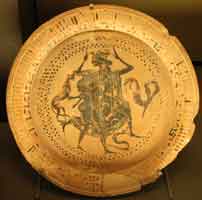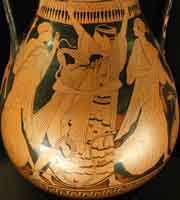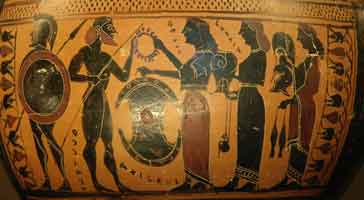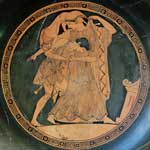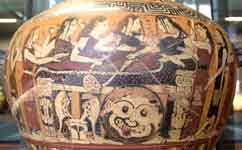In Greek mythology, silver-footed Thetis (Θέτις) is a sea nymph, one of the fifty Nereids, daughters of "the ancient one of the seas," Nereus, and Doris (Hesiod, Theogony), a grand-daughter of Tethys.
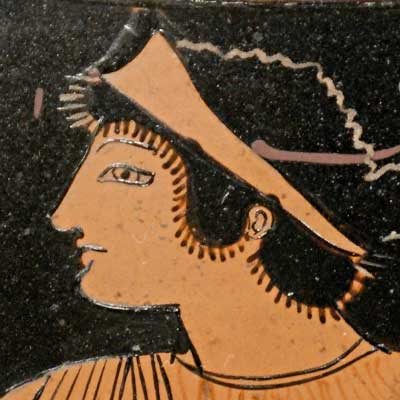
Thetis as goddess
While most extant material about Thetis concerns her role as mother of Achilles, and while she is largely a creature of poetic fancy rather than cult worship in the historical period, a few fragmentary hints and references suggest an older layer of the tradition where Thetis played a far more central role in the religious practices and imagination of certain Greeks.
The etymology of her name (from tithemi, "to set up, establish") suggests an early political role. Her aquatic functions suggest syncretism with powerful Near Eastern sea-goddesses like Tiamat.
In one fragmentary hymn by the 7th century BC Spartan poet Alcman, Thetis appears as a demiurge, beginning her creation with poros "path, track" and tekmor "marker, end-post". Third was skotos "darkness", and then the sun and moon. This cosmogony is interesting not only because it takes up Near Eastern astronomical and theological speculation, but also because its first principles are the building-blocks of a race-track, reflecting the athletic preoccupations of Spartan society and education. Given that she is the mother of Achilles, the Greek youth par excellence, it may be that Thetis once presided over the all-important realm of aristocratic adolescence.
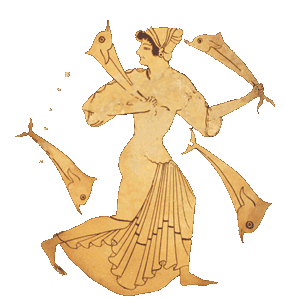
Thetis, from a red figure Kylix, Boston, Museum of Fine Arts
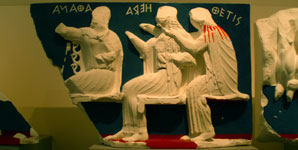
Siphnos Treasury Frieze , Color Reconstruction. Athena, Hera,Thetis

Thetis with a Triton , Massimo
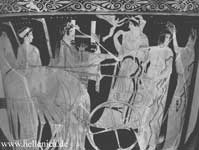
Thetis and Peleus, Ferrara T617
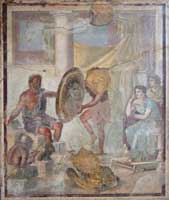
Achilles weapons, MNA Naples, Thetis and Hephaestus
Thetis and the other gods
Apollodorus writes that Thetis was once courted by both Zeus and Poseidon - she was given to the mortal Peleus only because of the prophecy by Themis or Prometheus that her son would excel his father. Quintus of Smyrna writes that Thetis once released Zeus from chains, perhaps at the hands of Typhon.
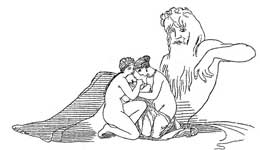
Eurynome and Thetis with the infant Hephaestus thrown from the Olymp
When Hephaestus was thrown from Olympus, whether cast out by Hera for his lameness or evicted by Zeus for taking Hera's side, the Nereids Eurynome and Thetis caught him and cared for him on the volcanic isle of Lemnos, while he labored for them as a smith, "working there in the hollow of the cave, and the stream of Okeanos around us went on forever with its foam and its murmur" (Iliad 18.369).
When Dionysus was expelled by Lycurgus with the Olympians' aid, he took refuge in the Erythraean Sea with Thetis in a bed of seaweed.
Thetis, Achilles and the Trojan War
Thetis is the mother of Achilles by Peleus, king of the Myrmidons. Zeus had received a prophecy that, should Thetis have a son by a god, that son would overthrow him. Therefore, in order to ensure a mortal father for her eventual offspring, Zeus and his brother Poseidon made arrangements for her marriage to a man, Peleus, son of Aeacus, but she refused him. Chiron, the wise centaur, who would later be tutor to Peleus' son Achilles, advised Peleus to find the sea nymph when she was asleep and bind her tightly to keep her from escaping by changing form. She did shift shapes, becoming flame and then a raging lion (compare the sea-god Proteus). But Peleus held fast. She then consented to marry him.
The Wedding of Peleus and Thetis, Peter Paul Rubens
Thetis dipping the infant Achilles into the River Styx, Follower of Peter Paul Rubens
Jupiter and Thetis, Jean-Auguste-Dominique Ingres
Thetis Receiving the Arms of Achilles from Vulcanus, Peter Paul Rubens
Thetis bringing the Armor to Achilles, Benjamin West
The wedding of Thetis and Peleus was celebrated on Mount Pelion and attended by all the deities: there the gods celebrated the marriage with feasting. Apollo played the lyre, and the Muses sang, Pindar claimed. At the wedding Chiron gave Peleus an ashen spear, and Poseidon gave him the immortal horses, Balius and Xanthus. However, Eris, the goddess of discord, had not been invited. In spite, she threw a golden apple into the midst of the goddesses that was to be awarded only "to the fairest." (The award was effected by the Judgment of Paris and eventually occasioned the Trojan War).
Thetis worked her magic on the baby Achilles by night, burning away his mortality in the hall fire and anointing the child with ambrosia during the day, Apollonius tells. When Peleus caught her searing the baby, he let out a cry.
"Thetis heard him, and catching up the child threw him screaming to the ground, and she like a breath of wind passed swiftly from the hall as a dream and leapt into the sea, exceeding angry, and thereafter returned never again." (A similar myth of immortalizing a child in fire is connected to Demeter; compare the myth of Meleager.)
In a variant of the myth, Thetis tried to make Achilles invulnerable by dipping him in the waters of the Styx (the river of Hades). However, the heel by which she held him was not protected by the Styx's waters. In the story of Achilles in the Trojan War in the Iliad, Homer does not mention this weakness of Achilles' heel.
Peleus gave the boy to Chiron to raise.
Prophecy said that the son of Thetis would have either a long but dull life or a glorious but brief life. When the Trojan War broke out, Thetis was anxious and concealed Achilles at the court of Lycomedes, disguised as a girl. When Odysseus found that one of the girls at court was not a girl, but actually Achilles, he dressesed as a merchant, and set up a table of vanity items and jewelry and called to the group. Only Achilles picked up the golden sword that lay to one side, and Odysseus quickly revealed him to be the warrior. Thetis then had Hephaestus make a shield and armor but then refused to pay him the favors she promised for the armor.
When Achilles was killed by Paris, Thetis came from the sea with the Nereids to mourn him, and she collected his ashes in a golden urn and raised a monument to his memory and instituted commemorative festivals.
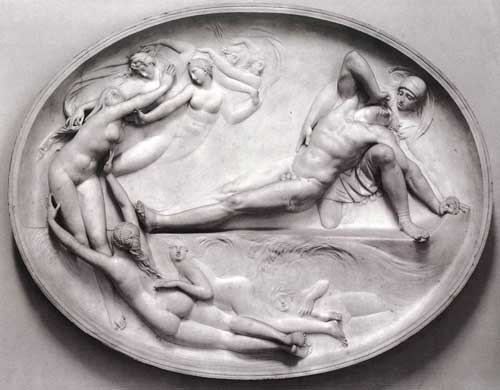
Thomas Banks (1735 - 1805), Thetis rising from the sea to comfort Achilles , marble bas-relief, 1778 Victoria and Albert Museum, London. Iliad Book 18. [Source]
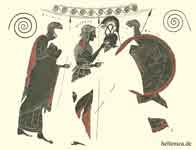
Phoenix, Achilles and Thetis, Boston Amphora
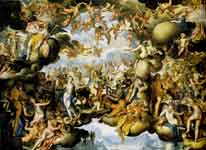
Wedding of Peleus and Thetis, Joachim Wtewael
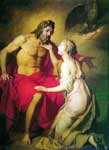
Zeus and Thetis, Anton Losenko
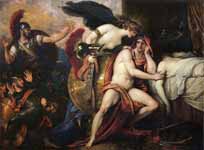
Thetis Bringing the Armor to Achilles, Benjamin West
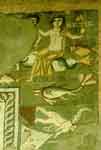
Tethys, Mosaic Garni (but with an inscription Thetis)

The Wedding of Peleus and Thetis, 1593, Cornelisz. van Haarlem, 1562-1638), Frans Hals Museum, Haarlem
Peleus and Thetis, Attic Red Figure Kylix , ca. 500 BC , Peithinos Painter, Berlin, Antikenmuseen
Deploration of Achilles by his mother Thetis and Nereids Corinthian Hydria, c. 560/550 BC, Damon Painter, an overview
References
Homer's Iliad makes many references to Thetis; Apollonius Rhodius, Argonautica IV, 770-879, Pseudo-Apollodorus The Library 3.13.5
Asteroid 17 Thetis
Music
Francesco Uttini (1723-1795). Thétis and Pelée
See also : Greek Mythology. Paintings, Drawings
Retrieved from "http://en.wikipedia.org/"
All text is available under the terms of the GNU Free Documentation License
| Ancient Greece
Science, Technology , Medicine , Warfare, , Biographies , Life , Cities/Places/Maps , Arts , Literature , Philosophy ,Olympics, Mythology , History , Images Medieval Greece / Byzantine Empire Science, Technology, Arts, , Warfare , Literature, Biographies, Icons, History Modern Greece Cities, Islands, Regions, Fauna/Flora ,Biographies , History , Warfare, Science/Technology, Literature, Music , Arts , Film/Actors , Sport , Fashion --- |






